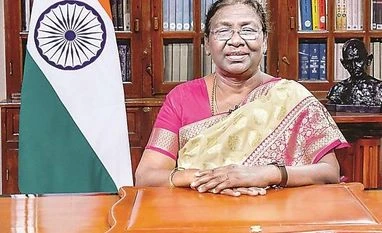All Indians must celebrate ‘democracy with Indian characteristics’, President Droupadi Murmu said on Sunday in her first Independence Day eve address to the nation, reminding the country about sacrifices for freedom made by women, as well as many adivasis who should be considered national heroes.
Murmu said when India won independence, many were sceptical about the success of the democratic form of government in India.
“They had their reasons to be doubtful. In those days, democracy was limited to economically advanced nations. India, after so many years of exploitation at the hands of foreign rulers, was marked by poverty and illiteracy. But we Indians proved the sceptics wrong,” she said.
She remarked that August 14 is observed as Partition Horrors Remembrance Day, harking back to an announcement made by Prime Minister (PM) Narendra Modi in 2021 about the legacy of India’s division.
Murmu said equality and oneness, messages given to the nation by Mahatma Gandhi, continue to be the ruling creed.
Much of Murmu’s speech was about the programmes launched by the Modi-led government that had contributed to making India noticed by the world. Whether it was the way the government led the vaccination programme for Covid-19 or the Pradhan Mantri GatiShakti Yojana or the Pradhan Mantri Awas Yojana that visualised a home for all, and the Atmanirbhar Bharat project, references to programmes flagged off by the PM were copious.
She added that “credit must also be given to workers and farmers whose hard work has made it possible and entrepreneurs whose business acumen has created wealth”.
“India is among the fastest-growing major economies in the world. India’s start-up ecosystem ranks high in the world. The success of start-ups in our country, especially the growing number of unicorns, is a shining example of our industrial progress,” the President said.
She added that it was all the more heartening that “growth is becoming more inclusive and regional disparities are reducing”.
The President said economic success is leading to ease in living as well. “Economic reforms are rightly accompanied by innovative welfare initiatives,” she said.
“The aim of these and many other similar efforts is to provide basic amenities to all, particularly the poor. The keyword for India today is compassion; for the downtrodden, for the needy, and for those on the margins”, she said.
The President’s observations come even as a debate was sparked off after the PM’s remarks that welfarism should not be equated with freebies. The contribution of women and girls to India’s standing was noted by the President.
“India’s new-found confidence stems from the spirit of its youth, its farmers, and above all, its women. Gender inequalities are reducing and women are moving ahead, breaking many glass ceilings. Their increasing participation in social and political processes will prove decisive. At the grassroots level, we have more than 1.4 million elected women representatives in Panchayati Raj Institutions,” she said, adding, “Our beloved country has given us everything we have in our life. We should pledge to give everything we can for the sake of safety, security, progress, and prosperity of our country.”
Unusually, the President did not quote a poet from her home state, Odisha, but instead flagged a poem by revered nationalist Kannada poet Kuppali Venkatappa Puttappa, popularly known by his pen name Kuvempu, which says India will live far beyond and longer than all its citizens.
Unlike her predecessor Pranab Mukherjee, who utilised speeches to deliver political messages, both to the government and the Opposition, or Ram Nath Kovind, who addressed issues like secularism and inequality in many speeches, Murmu bypassed references to controversial or potentially divisive matters, preferring to dwell on nationalism, unity, and the greatness of India’s ancient heritage, focusing on two makers of modern India – Gandhi and Bhimrao Ambedkar.
Unlock 30+ premium stories daily hand-picked by our editors, across devices on browser and app.
Pick your 5 favourite companies, get a daily email with all news updates on them.
Full access to our intuitive epaper - clip, save, share articles from any device; newspaper archives from 2006.
Preferential invites to Business Standard events.
Curated newsletters on markets, personal finance, policy & politics, start-ups, technology, and more.
)